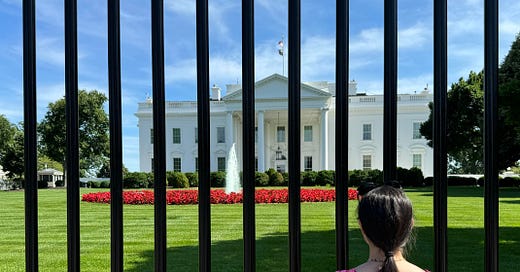The last time I lived in Washington, DC, I worked in the Senate during the George W. Bush administration.
The year was 2006 and social media platforms like Twitter (X), YouTube, Instagram and others didn’t factor into the national conversation yet. The Tea Party wouldn’t form for 3 more years. And just next door to my office in the Hart Building, a bright young senator named Barack Obama was drawing a lot of attention - and speculation - related to the upcoming 2008 presidential election.
It seemed as if everyone I worked with at the time worried that our government had never been so gridlocked. Compromise between Republicans and Democrats appeared to be harder than ever as the nation became increasingly polarized. And the scientists I met with regularly expressed their growing concern that too many policies were enacted based on partisanship rather than evidence.
The experience of being a congressional science fellow fundamentally changed my career. Rather than return to academia on the path to become a tenure track professor, I spent the next two decades navigating the intersections of science, policy, and people. My first book, Unscientific America, co-authored with Washington Post journalist Chris Mooney in 2009, explored the growing disconnect between science and society. But back then, I could not have imagined the way everything would continue to shift in the years to come.
Over the next decades, I kept a foot in academia where I have continued writing, speaking, and teaching about the vast gulf of mutual incomprehension between scientists and everyone else. I cofounded Science Debate to bring more citizens into science policy conversations. And the series Serving Up Science allowed me to use storytelling to share science related challenges with broad audiences.
Eventually, I returned for a PhD in the social sciences to study the role of human decision making in the policy process, which I’ve been sharing on this substack. The final chapter of my dissertation looked closely at how and why Congress has changed over the last half century.
Now that I’m done, it’s time to experience some of those changes firsthand. So I’m moving back to DC next month as an International Affairs Fellow.
I’m excited to embark on this new journey and frequently find myself wondering what it will be like to work in the nation’s capital again two decades on.
After all, a LOT has happened since I left. A radically different media environment, the rise of AI, a global pandemic, climate change as a voting issue(!), three wildly different administrations, and on and on. It’s one thing to dive into the academic literature and gather data about our political system, but quite another to become one tiny part of the process again.
And with the upcoming election around the corner, 2024 will certainly be an interesting time to return.





Good luck!
I'll say this for you — you don't let lot of grass grow under your feet. :-)